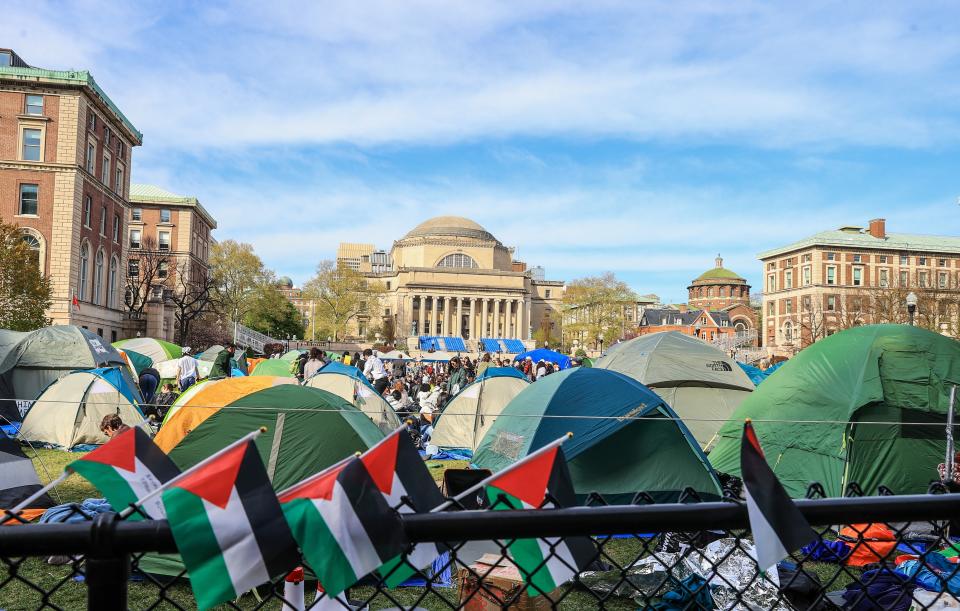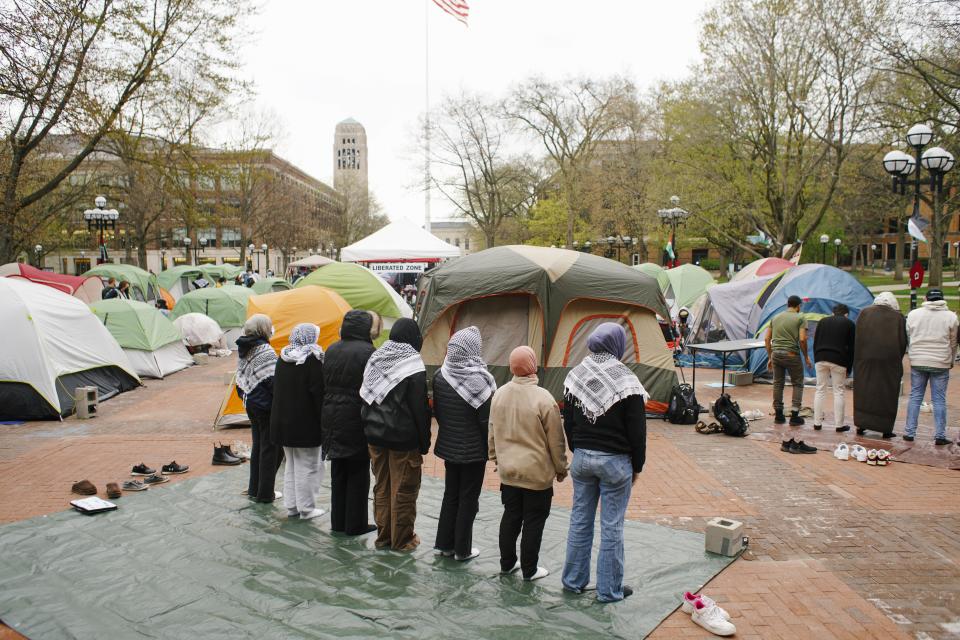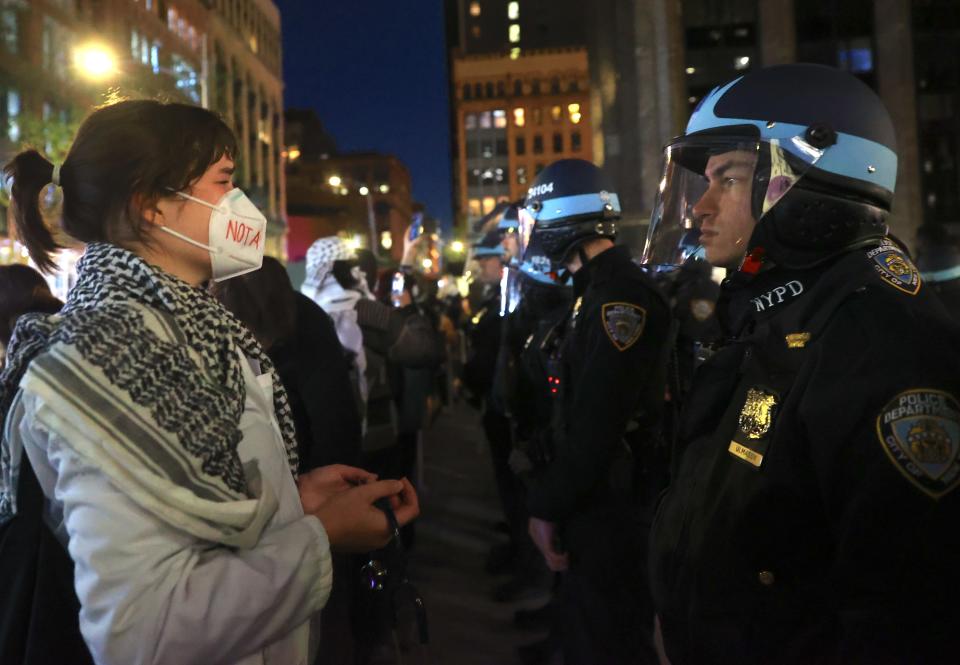University Protests at Columbia, NYU, and More: Pro-Palestine Encampments Spread Over Israel Divestment

Anadolu/Getty Images
The past week has seen pro-Palestine encampments sprout up on college campuses across the US, as students try to push universities to divest from financial ties to military companies.
At schools including Columbia, Yale, and NYU, dozens of students were suspended and arrested for their involvement in the protests, like Rep. Ilhan Omar’s (D-MN) daughter and Barnard student, Isra Hirsi. The University of Southern California (USC) blocked its valedictorian, Asna Tabassum, from speaking at commencement over references to Palestine on her social media accounts, including a link to a site that some Jewish groups on campus criticized as antisemitic. The decision to stop Tabassum – who claims she had not yet written her valedictorian speech – from speaking led to protests and resignations from within USC. This morning at 7 am local time, USC students launched their own solidarity encampment; as this story prepared for publication, Harvard launched an encampment.
State and national politicians have also been weighing in, and there’s a lot of confusion. Read on for what we know so far.
What is the focus of the protests?
The encampments are a push to direct attention to events on the ground in Gaza, where an ongoing incursion by Israel has killed more than 34,000 Palestinians, according to the Associated Press, following the October 7 Hamas attack in which 1,200 Israelis were killed and over 200 taken hostage.
A Tuesday release from the United Nations noted the discovery over the weekend of 283 bodies found in mass graves outside Nasser and Al-Shifa Hospitals in Gaza. On Monday in Rafah, where over a million Palestinians are in refuge from ongoing warfare, 22 people, including 18 children, were killed by Israeli strikes.
While US college campuses are in focus at the moment, over 80% of educational institutions in Palestine have been destroyed, prompting UN experts to ask if Israel is intentionally carrying out a “scholasticide”: “the systemic obliteration of education through the arrest, detention or killing of teachers, students, and staff and the destruction of educational infrastructure.”
US students, organizing with campus chapters of groups such as Students for Justice in Palestine (SJP) and Jewish Voices for Peace (JVP), are pushing school leaders to divest from companies with economic ties to or investments in Israel. The campus divestment movement, which predates the onset of the current war, has gained momentum in recent months. At the same time, penalties for students who protest have sharply intensified; earlier in April, Teen Vogue reported on the suspensions, expulsions, evictions, arrests, and more happening on campuses, including at Vanderbilt University, Pomona College, and Columbia.
On April 17, Columbia and Barnard students set up a Gaza Solidarity Encampment outside the school’s library ahead of President Minouche Shafik’s testimony at a congressional hearing on campus antisemitism. Shafik authorized the New York Police Department to break up the encampment and arrest more than a hundred students, drawing national media attention.

'Gaza Solidarity Encampment' entered its one-week at Columbia University
Anadolu/Getty ImagesSince then, student encampments have spread across the country.
On Friday, the National Students for Justice in Palestine organization called for more campuses to join in and launch solidarity encampments calling for divestment. That morning, encampments popped up at schools such as the University of North Carolina, and protests at schools including Miami University in Ohio. Over the weekend and into this week, other schools have also joined:
In New York City, the New School launched an encampment on Sunday, April 21; New York University launched its encampment on Monday, April 22 (more on NYU below).
On Monday, encampments were started at Swarthmore College in Pennsylvania, the University of Michigan, and the University of California Berkeley.

Pro-Palestinian protest in the University of Michigan
Anadolu/Getty ImagesOn Tuesday, encampments were started at the University of Minnesota, where nine people were reportedly arrested and the camp dispersed that same day — until later that day, when another encampment went up. The University of Pittsburgh also launched an encampment on Tuesday.
Multiple Texas university chapters launched sit-ins on Tuesday at the University of Texas Houston, UT Dallas, and Rice University.
On Wednesday, in addition to USC, an encampment was started at Brown University.
We’re also seeing encampments develop globally: Social media posts show divestment protests at the American University in Cairo, Egypt, and Sydney University in Australia.
In Boston, MIT, Tufts, and Emerson College have started encampments.
And at Yale University, which launched its encampment on April 19, 45 protesters were arrested on Monday morning and charged with “first-degree trespassing.”
What has the scene been like on campuses?
Monday was an especially caustic day on campuses. At NYU, after the school threatened to forcibly remove the encampment, NYPD officers pepper-sprayed students (including, reportedly, a student journalist) and mass arrested NYU faculty. In a statement from NYU spokesperson John Beckman published that night, the school claimed “disorderly, disruptive, and antagonizing behavior” had caused “safety issues” which led to the arrests, a narrative the university’s American Association of University Professors (AAUP) chapter has disputed.
In response to a request for comment, the NYPD confirmed to Teen Vogue that “120 individuals were taken into custody” and “116 were all released with summonses for trespass.” The New York Civil Liberties Union later condemned NYU’s decision to call in the NYPD.

NYPD arrests Pro-Palestinian protesters as demonstrations spread from Columbia University to others
Anadolu/Getty ImagesAt Cal Poly Humboldt, students barricaded themselves in a campus building and fought off riot police trying to enter the building. The campus is currently closed through Wednesday and all classes have gone remote. In an emailed statement to SF Gate, a Cal Poly Humboldt spokesperson said they were “concerned about the safety of students who remain in the building.” (Teen Vogue has reached out to the school for comment.)
Disproportionate focus has fallen on New York's Columbia University, where several university bodies and individuals have condemned the response from school leadership. Faculty members have rallied around the students, condemning the decision by the university to suspend and arrest student protesters; and on Monday, over a hundred faculty members walked out to support the student encampment. The university has made this semester's final week of classes remote.
Politicians all the way up to the White House have condemned reports of antisemitism toward some Jewish Columbia students. On Saturday, the Columbia Spectator reported, in an event that occurred outside Columbia’s campus gates, 10 pro-Israel student counterprotesters were reportedly yelled at to “go back to Poland and Belarus” and chased by other pro-Palestine protesters.
In a statement, J Street U Columbia said, “Many Jewish students on our campus feel unsafe solely because of their Jewish identity.” The group criticized what it called the “negligence” of pro-Palestinian student leaders for, as they see it, failing to forcefully condemn antisemitic rhetoric, but defended their right to protest and blamed school leadership for calling in police to dismantle a peaceful protest.
A recent national poll from the Institute for Social Policy and Understanding found that Muslim and Jewish people alike have experienced a marked rise in harassment in public spaces in the last year. Multiple college campuses nationwide have reported instances of antisemitic graffiti, harassment, and rhetoric. Muslim, Arab, and pro-Palestine students have alleged physical attacks and harassment; and on Tuesday, members of Columbia SJP, as well as abolitionist writer Derecka Purnell, accused the university of ignoring harassment against pro-Palestine members on campus. (Teen Vogue has reached out to Columbia for comment.)
Columbia University Apartheid Divest Coalition, a student group comprised of over 100 Columbia clubs formed after the school banned its SJP and JVP chapters, released a statement denouncing the actions of “inflammatory individuals who do not represent us”:
“We firmly reject any form of hate or bigotry and stand vigilant against non-students attempting to disrupt the solidarity being forged among students—Palestinian, Muslim, Arab, Jewish, Black, and pro-Palestinian classmates and colleagues who represent the full diversity of our country,” the statement read in part. “We have been peaceful.”
At Harvard, where campus conflict has been constant since October 7, university leaders closed campus on Sunday in anticipation of related protests. On Monday, despite no encampment being launched, the university suspended the campus’s student-led Palestine Solidarity Committee.
What concrete action have students taken in the past week?
Following prior successful student divestment votes at University of California Davis and Rutgers University:
On Monday, Cornell passed its first undergrad student referendum in over 25 years calling for a permanent ceasefire in Gaza and for university divestment from a number of manufacturers, including BAE Systems, Boeing, Elbit Systems, General Dynamics, and more, per the vote statement. Last week, the day before the vote began, 22 students and two Cornell staffers were arraigned on trespassing charges over a March sit-in.
Also on Monday, Columbia College students passed a referendum in favor of divestment, closing a university center in Tel Aviv, and ending a dual degree program with Tel Aviv University; Barnard College’s referendum vote is ongoing. In the first 24 hours of Columbia's encampment, according to students, Columbia agreed to release the details of its investments in Israel, one of the organizers’ main demands.
Correction: This article originally included Miami University in Ohio on the list of schools with encampments. Students actually held a walkout and protest.
Stay up-to-date with the politics team. Sign up for the Teen Vogue Take
Originally Appeared on Teen Vogue
More great activism coverage from Teen Vogue:


